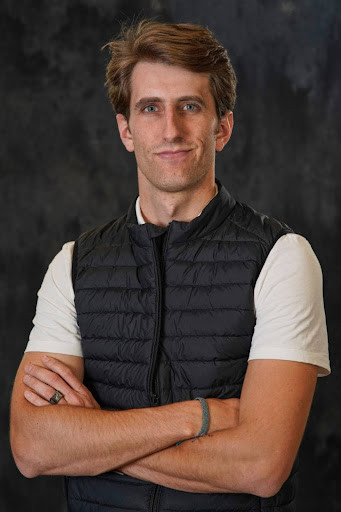From IPOs to AI Energy: Luis Martin's Vision for Systemic Entrepreneurship

What does it take to build a business that lasts? For strategic innovation leader Luis Martin, the answer lies in the systems behind the scenes.
Over the past decade, he's led billions of dollars in acquisitions, managed one of Europe's most successful tech IPOs, helped to implement AI at a fast-growing Asian neobank, and scaled clean energy infrastructure.
Each of these milestones was part of a broader strategy that Martin calls "systemic entrepreneurship," a deliberate, long-term approach to innovation that prioritizes foundational change over short-term disruption.
Shaped by a decade of strategic reinvention across multiple industries, Martin's career offers a case study in how strategic patience can drive sustainable business success.
The Rocket that Launched a Roadmap
In 2015, Luis Martin stood alongside his father and grandfather watching SpaceX's Falcon 9 land back at Cape Canaveral, Florida. Witnessing this technological marvel showed him what human ingenuity and long-term thinking combined with relentless execution could achieve, and inspired him to learn how to build the systems that make these types of breakthroughs possible.
To realize this goal, he first had to gain experience in high-stakes business environments. From there, he planned to pursue advanced education in innovation and technology before applying those tools to industry-leading ventures.
In his words: "the inspiration from that Falcon 9 landing weekend has driven my decade-long journey toward impactful technological entrepreneurship."
Building the Business Case for Systemic Change
Martin began his career in management consulting and corporate strategy at global consulting firm Ernst and Young. He joined shortly after graduating and began developing an expertise in mergers and acquisitions that would serve him well at his next stop.
In 2017 he joined Allfunds, a major financial platform undergoing a radical transformation. As the company transitioned from a traditional fund distributor into a technology-driven WealthTech platform offering digital tools, Martin was tasked with helping to find partners that could drive that change.
Over the next five years, he led the acquisition of eight companies across Europe, overseeing transactions valued at more than €1.5 billion, and also served as the project manager for the company's IPO, which was recognized as "EMEIA IPO of the Year" in 2021.
At Allfunds, Martin helped modernize a legacy institution from within, showing that transformation was possible without starting from scratch.
With the completion of the IPO, it was time for the next milestone on his career roadmap.
From MIT to Southeast Asia: Turning Theory into Practice

Martin entered the MBA program at MIT Sloan in 2022 with the clear goal of deepening his expertise in innovation, enterprise AI, deep tech commercialization, and venture capital.
He eventually joined up with his fellow MBA students to help GoTyme, one of Southeast Asia's fastest-growing neobanks, implement AI into its daily operations. GoTyme's goal was to help customers from the Philippines bank entirely online, but as it grew, users began to disengage because customer support was lacking.
To help solve this issue, Martin and his team created AI algorithms that could predict when users were likely to disengage and send personalized, automated follow-ups to try and prevent them leaving. The team then introduced an AI-enabled chatbot that improved customer service by answering questions immediately, freeing up human reps to manage more complex needs.
He also realized the importance of the human systems behind technology. When frontline employees resisted adoption for fear of being replaced by AI, he led workshops in which he reframed the tools as supportive rather than threatening. "This collaborative approach transformed initial skepticism into enthusiastic adoption, improving customer satisfaction in the process," he explains.
At MIT, Luis also became a mentor and guide to early-stage founders. As a teaching assistant in the Fintech Ventures Studio course, he helped student teams refine their ideas, sharpen their GTM strategies, and prepare for investor conversations. One of the founders he mentored went on to raise significant capital and join the MIT accelerator, a partnership that continues to this day.
Mentoring at MIT showed him that building systems also meant helping others build their own.
How Luis Martin Helps to Power the Future at Exowatt
Martin now works at clean energy company Exowatt, where he leads growth and strategic initiatives designed to scale dispatchable, clean energy systems for AI.
AI has a power problem, as it creates massive energy needs around the globe. Exowatt helps combat this by concentrating solar energy as heat, storing it as thermal energy, and then converting it back to electricity on demand, allowing for constant and consistent distribution of power.
It's a more sustainable way to solve the power demands of AI.
Most importantly, Exowatt is approaching AI's biggest challenge at the systems level, as they realize that the next stage is not just about more powerful algorithms but the underlying infrastructure. Martin's emphasis on systems is central to making that approach work.
A Career Built on Structure, Not Speed
Rather than chasing trends or quick wins, Luis Martin has focused his career on building the systems that support more sustainable innovation. From major acquisitions and a landmark IPO to deploying AI in emerging markets and scaling clean energy infrastructure, each step in his career is part of his broader plan.
His success isn't because of luck, a sudden pivot, or unexpected breakthrough, but a decade of hard work, dedication, and compounding experience which has refined his ability to help meaningful progress take root.
His approach is a reminder that meaningful progress is built over time, guided by structure and purpose rather than immediacy or impulse.
© Copyright IBTimes 2025. All rights reserved.




















